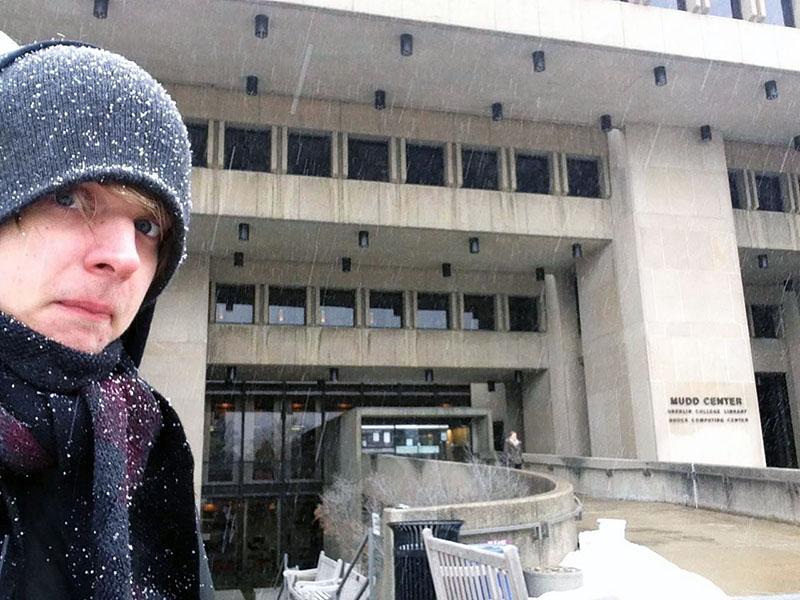On the Record: Steve Roggenbuck
Poet Steve Roggenbuck takes a selfie in front of Mudd library despite the extreme Ohio cold. Roggenbuck gave a workshop on social media self-promotion in Wilder and a poetry reading at Fairchild Chapel this past Saturday.
March 14, 2014
This past Saturday, poet Steve Roggenbuck, renowned for his use of the Internet to create a new form of poetry and relationship with an audience, held a workshop and poetry reading in Oberlin. As soon as he arrived in Oberlin, the Review sat down with him in DeCafé to ask him about the Internet as an artistic realm of expression, building a readership and making a living as a poet.
Why did you choose the Internet as a medium for sharing your poetry?
I like the Internet because it reaches people in these populous platforms. … It’s real people sharing stuff that they really like. And I don’t have to play a game with trying to get what editors want, I don’t have to do what an editor wants or network with certain people; it’s like my posts got to everybody and they can be re-blogged and shared between common people … and they love the feeling that [my poems] give them.
What is your lifestyle like?
When I really started doing it full time, I was couch surfing just so that I wouldn’t have to pay rent, and I would take a lot of cheap buses (usually Megabus) between cities. I would stay on people’s couches that I knew from the Internet. I was trying to live very cheaply so that I only had to sell a certain amount of books a month, like a hundred books. … I built [my presence] up very gradually. My Internet community was small. And then it [has] just been buzzing. … I was on social media every day, reaching out to people and [drawing] attention to my videos and my poems, and then hopefully some of those people would get hooked and would become regular followers. I also did live streams. And then I started going on tour more, doing readings like [the one at Oberlin]. And so now the main way that I make money is through those tours, I think.
So do you do the readings because you can see the audience that you cannot see through the Internet?
Yeah, I like doing the readings, but I also think that people underestimate the kind of impact you can have on people over the Internet. There have been certain musicians and certain bloggers who have had a profound impact on my life, but I have never met them in person, like the people who have probably affected my life more than anybody, or as much as anybody. It’s starting to come around — people are starting to realize that you can build a friendship or even a romantic relationship with someone. You can really touch people through the Internet.
Do you think the Internet will remain your artistic realm?
Yeah, I think the Internet is the most efficient way to reach a lot of people regularly because it’s free to post on all these sites, and I can reach thousands and thousands of people every day, whereas when I’m at a reading, I can get 50 people usually, maybe. And maybe [in-person readings have] a higher impact, but on the Internet it just reaches a lot more people. And [as for] being in someone’s life every day, I can’t tour every place every day, but I can be there for people on the Internet every day.
Many writers aspire to hard-copy publishing, but your focus seems to be on reaching people through social media. Do you think you will ever adhere to this traditional idea of a writer?
I do publish books every once in a while. … I like [self-publishing] because I get total freedom of what I want to put into it. I don’t have to check with an editor. … I guess that’s the same as artistic freedom, like I can put it in the public domain, where people can share it. And I actually make more money per book because of the self-publishing, so it helps me be an artist with a small community and still make enough to live off of — whereas with a publisher, Amazon takes a big chunk, bookstores take a big chunk, distributors take out a big chunk, the editors take out some, and you’re left with only a couple of dollars per book. So you have to sell a lot more books in order to make enough money to live off.
What is the primary message of your work?
It’s a spiritual sort of message: It’s about appreciating your time in the world. It’s about being here, whilst we [are] here. … But there’s one [message] that I have that is more popular, from the past. It’s called: Stop pretending it’s boring to be alive. I think a lot of people get sort of deadened to what life is because they are doing the same things every day. … It’s very hard to keep your wonder about the world and keep a sense of excitement that you are here to do something, and that you are with people, and that you get to make a difference if you want. It’s trying to get people thinking about that sort of basic stuff. I like when people zoom out and sort of see the context of their lives instead of getting caught up with all the little problems of their day. I started talking about different forms of activism more [in my work], like different ethical and political things I believe in because I think that is part of doing something responsible with our time here. … And then also I have a particular sense of humor that I think is kind of wacky, and I share it with a lot of people — not everybody — but it’s very special to connect with somebody else who has the same sense of humor. It’s sort of like, it makes you laugh kind of forcefully, and that can be really magical.


























